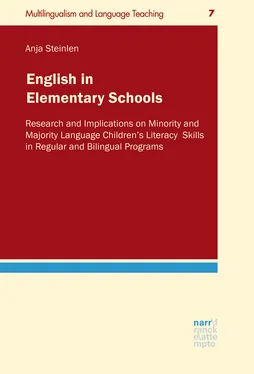In sum, this chapter provided information with respect to the development of reading and writing skills in the L1 and in the L2. The examples above also point to the complex (and also crosslinguistic) relationship between reading and writing (see e.g., Schoonen, 2019 for a review), which will certainly affect the outcomes of any (foreign) language literacy test, including the ones presented here.
2.2 Regular elementary school English programs in Germany
In the school year 2019/20, over 2.9 million students attended one of the 15,431 (private or public) elementary schools in Germany (Statistisches Bundesamt, 2020b). Since 2004 foreign language (FL) teaching has been compulsory in elementary schools in Germany; however, there are differences across the Federal States in terms of the beginning year and the number of weekly lessons in the foreign language (e.g., Fleckenstein, Möller & Baumert, 2020; Hempel, Kötter & Rymarczyk, 2018). For example, the first foreign language is introduced in Baden-Württemberg in Year 1 (until 2019) but in Berlin-Brandenburg and Schleswig-Holstein in Year 3. In most schools, the FL is taught between one and two hours a week (e.g., Börner, Böttger, Kierepka & Lohmann, 2017; Fleckenstein et al., 2020; Hempel et al., 2018). In the following, elementary schools in which a FL (such as English) is taught as a separate subject are referred to as schools with a regular / mainstream / traditional / conventional FL program.
Traditional FL teaching at school is characterized by a course-oriented approach, in which the foreign language itself is the subject of study. The primary goal of FL lessons is to master the new language as faultlessly as possible. Foreign language skills (including vocabulary and grammar) are usually taught and practiced with the help of textbooks and other materials, which present selected subject matters (Wolff, 1997). Thus, the acquisition of the FL does not happen naturally but through prefabricated and systematized foreign language input (e.g., Burmeister, 2006; Möller, Hohenstein, Fleckenstein, Köller & Baumert, 2017b).
According to Kolb (2012: 32), there are five objectives of EFL (English as a foreign language) teaching at elementary schools. These include attitudes towards language learning (to develop a “positive mind-set” (Schmid-Schönbein 2008: 37) for foreign language learning in general); intercultural learning (to promote an open and tolerant attitude towards other languages and cultures and prepare the children for intercultural encounters); language and cultural awareness (to raise children’s sensitivity for differences among languages and cultures); language learning competence (regarding, for example, learning strategies and techniques); and language competencies, i.e., basic communicative competence in the foreign language (relating to the five skills of listening, speaking, reading, writing and mediation). The language competencies acquired at elementary level correspond to the level A1 of the Common European Framework of Reference (Council of Europe, 2001, 2018) with a focus on listening and speaking (see Chapter 2.2.2). They are assessed in familiar communicative situations of language use in order to increase children’s self-confidence, employing assessment tools such as pen and paper tests as well as observation sheets and language portfolios (e.g., Kolb, 2012).
2.2.1 Controversial views on EFL reading and writing in elementary school
For many years, there has been a controversy regarding the introduction of FL reading and writing in elementary school. FL literacy skills played only a minor role in the curricula of the Federal States of Germany, and, consequently, literacy activities in the target language were often neglected (or not carried out at all) in elementary school FL classrooms. Critical views which have been put forward on introducing FL reading and writing during the elementary school years include the following arguments (see e.g., Doyé, 2008; Frisch, 2013; Legutke, Müller-Hartmann, Schocker-v. Ditfurth, 2009; Piske, 2010, 2017a, b; Treutlein, Landerl & Schöler, 2013 for more details):
(1) Given the already limited time of exposure, it is irresponsible to familiarize learners with English spelling. The focus in elementary EFL is, therefore, on developing oral and not written communicative competences (i.e., the primacy of oral skills).
(2) Due to the irregular grapheme-phoneme relationships in English, EFL reading and writing tasks put excessive demands on learners (particularly on weak ones), who already have to cope with literacy development in their first language or in the majority language.
(3) Competences in FL reading and writing may be misused as an additional criterion to select learners for transition to different secondary school types (i.e. Haupt-/Mittelschule, Realschule, Gymnasium).
(4) Due to interferences, the introduction of the English writing system may negatively affect the acquisition of written (and oral) German.
Many of the arguments listed above have been invalidated in a number of studies (see Piske, 2010 or Frisch, 2013, for a review). Nowadays, there is a strong tendency to offer a greater number of reading and writing activities the EFL classroom (see e.g., Burwitz-Melzer, 2010; Diehr & Rymarczyk 2010; Frisch, 2013; Legutke et al., 2009; Piske, 2010, 2017a, b; Rymarczyk, 2016):
(1) The learners want to write in English and do so independently and quite naturally, without their teacher asking or supporting them to do so, for the same purposes as they use this skill in their L1.
(2) If prevented from writing, learners may get used to wrong spellings, which may be difficult to change (fossilization). Therefore, it is better not to withhold the correct spelling of words.
(3) Not only are learners interested in writing, but they are also able to identify, understand and become aware of the different principles on which different writing systems are based, provided the explanations are age appropriate.
(4) Integrating reading and writing supports learning, i.e., it appears to be easier for some L2 learners to identify word boundaries or to remember words or phrases if they have seen them in their orthographic form.
(5) Writing activities increase the diversity of teaching methods in the EFL classroom.
(6) Children will start to develop an awareness for individual sound segments such as vowels and consonants only when they learn to read and write alphabetic symbols.
The controversy about whether to introduce English reading and writing in elementary school seems to have subsided in recent years. Nowadays the focus is rather on the question of how to introduce the English writing system. However, there is a dire need for studies relating different approaches to outcomes in L2 reading and writing. For the German context, Frisch (2013) examined effects of different methodological approaches (i.e., the Phonics and the Whole Word Method) on L2 reading, which is discussed in greater detail in chapter 7.1.
2.2.2 Curricula for English-as-a-subject relating to reading and writing
As noted above, FL reading and writing used to play only a minor role in the elementary school curricula of the Federal States of Germany. Nowadays, though, the target level for functional communicative competences (including FL reading and writing) at the end of grade 4 is generally aimed at level A1 (Standing Conference of the Ministers of Education and Cultural Affairs, Kultusministerkonferenz, KMK, 2013a). This competence level describes an elementary use of language, i.e., the students can communicate in a simple manner, and understand and use everyday expressions and very simple sentences (cf. Council of Europe, 2001, 2018). With respect to literacy skills, level A1 students
Читать дальше












